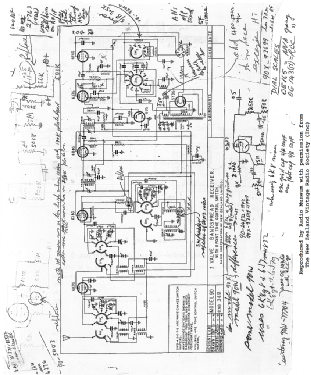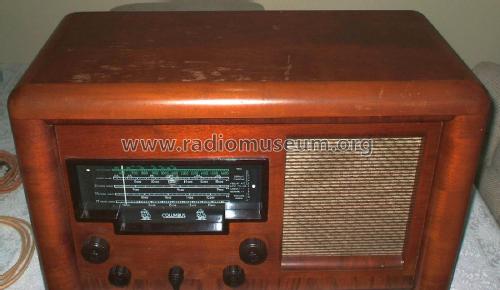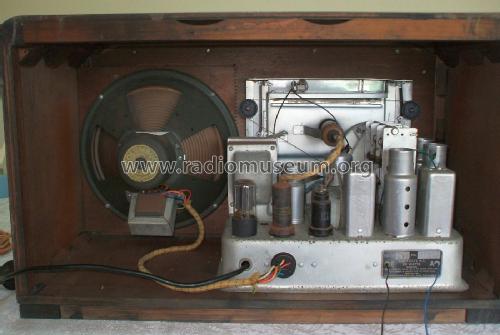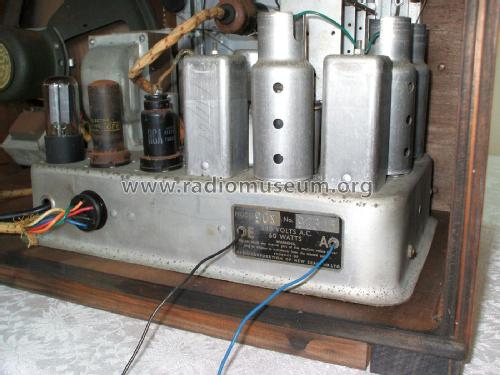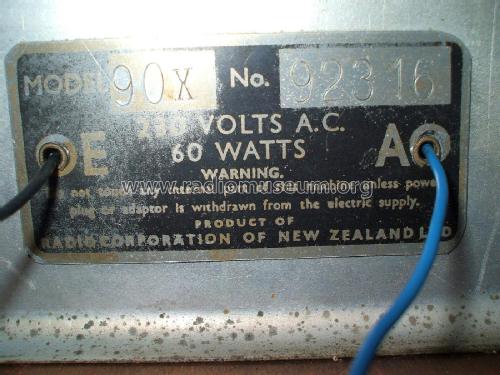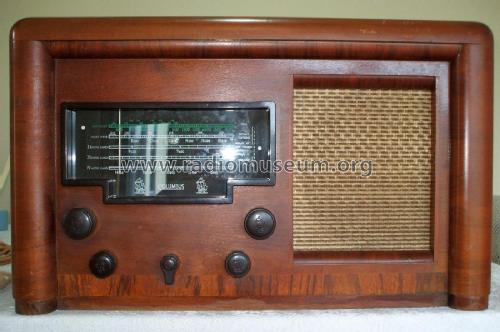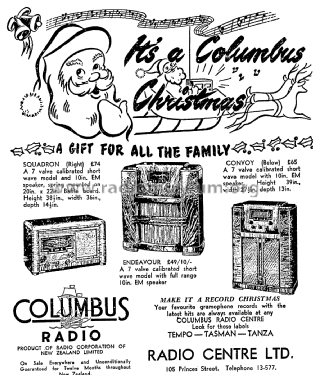Columbus Endeavour 90X Mantel
Columbus (Brand); Radio Centre Ltd.; Wellington
- Paese
- Nuova Zelanda-Aotearoa
- Produttore / Marca
- Columbus (Brand); Radio Centre Ltd.; Wellington
- Anno
- 1949
- Categoria
- Radio (o sintonizzatore del dopoguerra WW2)
- Radiomuseum.org ID
- 345626
Clicca sulla miniatura dello schema per richiederlo come documento gratuito.
- Numero di tubi
- 7
- Principio generale
- Supereterodina con stadio RF; ZF/IF 455 kHz; 2 Stadi BF
- N. di circuiti accordati
- 7 Circuiti Mod. Amp. (AM)
- Gamme d'onda
- Onde medie (OM) e più di 2 gamme di onde corte (> 2 x OC).
- Tensioni di funzionamento
- Alimentazione a corrente alternata (CA) / 230 Volt
- Altoparlante
- AP elettrodinamico (bobina mobile e bobina di eccitazione/di campo) / Ø 10 inch = 25.4 cm
- Materiali
- Mobile in legno
- Radiomuseum.org
- Modello: Columbus Endeavour 90X [Mantel] - Columbus Brand; Radio Centre
- Forma
- Soprammobile basso, con andamento orizzontale (grosse dimensioni).
- Annotazioni
-
The Columbus Endeavour 90X was the last in this model series which started with the Model 90 in 1942 followed by the Model 90W of 1947.
7-Valve superhet with RF stage 5 band mantel receiver.
See also Table Model 90 Endeavour, Console Model 90 Escort, Console Model 90 Convoy, Console Model 90X, Console Model 90 Squadron, Console Radiogram Model 90 Continental, Console Radiogram Model 90 Caravel & Console Radiogram Model 90 Flotilla.
Valves:
Early Model 90: 6K7G, 6J8G, 6B8G, 6J7G, 6U5, 6F6G, 5Y3G.
Later Model 90X: 6K7G, 6K8G, 6B8G, 6J7G, Y63, 6F6G, 5Y3G.Tone Control: The 11-position tone control, the 'Columbus Electronic Ear' as it was known, was an advanced solution to try and help the listener get the best listening experience based on what they were listening to.
Positions 1-5 are for distant stations and the radio is working with its full sensitivity. This means the set could also be pulling in static and interference - as you move towards position 5 more and more of the high frequencies are cut out to compensate.
Positions 6-8 are for fidelity between low and normal listening volumes - in any of these three positions the set would reduce its sensitivity and (according to Columbus sales literature) 'apply this extra power to achieve fidelity'. These positions are designed to give the highest quality of faithful reproduction at the expense of distance-getting ability. Position 8 is for listening at a normal volume, but as the volume reduces the highs and lows start to disappear due to the human ear being less sensitive to them at low levels, so positions 6 and 7 boost these to compensate.
Positions 9-11 are the reduced treble settings for local station listening - designed to remove surface hiss from high fidelity transmissions (as music transmissions were primarily from records at this time). It was noted that for studio broadcasts (live studio music) that this hiss did not occur so these settings should not be used in this case.
Manufactured by Radio Corporation of New Zealand Ltd for Columbus Radio Centre Ltd
- Prezzo nel primo anno
- 49.50 NZ £
- Bibliografia
- -- Original prospect or advert (Otago Daily Times 5 December 1949 Page 2)
- Letteratura / Schemi (1)
- More Golden Age of Radio (Page 118 (console model))
- Autore
- Modello inviato da Brian Stevens. Utilizzare "Proponi modifica" per inviare ulteriori dati.
- Altri modelli
-
In questo link sono elencati 173 modelli, di cui 135 con immagini e 161 con schemi.
Elenco delle radio e altri apparecchi della Columbus (Brand); Radio Centre Ltd.; Wellington
